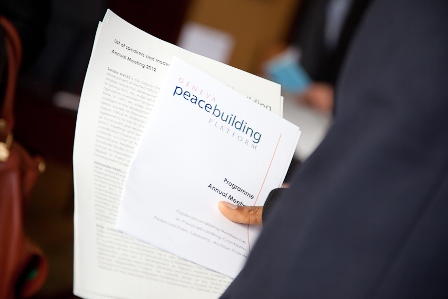Discussing resilience in peacebuilding contexts

On the occasion of the Geneva Peacebuilding Platform Annual Meeting 2012 practitioners and experts gathered to discuss ‘resilience’ in peacebuilding contexts. The conference, titled "Operationalizing Resilience in Peacebuilding Contexts: Approaches, Lessons, Action Points" explored the meaning of resilience, its application in different fields, and best practices in the attempt to foster resilience in fragile contexts.
‘Resilience’: a term with multiple meanings and promising potential
"Resilience has different meanings for different people", remarked Director-General of the United Nations Office at Geneva Tokayev in his opening speech. Giving a single definition of the term ‘resilience’ is a difficult task, as Prof. Ken Menkhaus confirmed in his keynote speech. The reason for this is the use of the term in multiple disciplines, such as engineering, ecology, psychology, economics and humanitarian action, each of which brings with them a distinct understanding.
Even in the field of peacebuilding there is no clear definition. But the core idea is that resilience refers to the ability of a society or a political system to rebound after violent conflict. Adding to these different facets, Scott M. Weber, Director-General of Interpeace, pointed out the notion of ‘negative resilience’. This is for example the ability of criminal gangs in Central America to retain their operations despite intense policy efforts to the contrary. This overall conceptual ambiguity makes it difficult to apply ‘resilience’ to project implementation, for example in evaluation and monitoring.
In spite of these challenges, Prof. Ken Menkhaus encouraged the present peacebuilders to further pursue the promising path of ‘resilience’. The Swiss Ambassador to the United Nations Alexandre Fasel joined in this optimism by expressing that the perspective of resilience has the potential to shift the focus of peacebuilding towards conflict prevention.
‘Resilience’: a concept spanning across different fields
During the first panel discussion international practitioners active in disaster reduction, humanitarian affairs, environmental protection and the business sector exchanged different approaches to resilience in their respective fields. They agreed that their common desire was to “give people the tools to build a sustainable society.” Discussants also emphasized that strengthening resilience can only succeed if international actors acknowledge the existing potential of national and local actors and include them in their programming.
‘Resilience’: a practice with worldwide relevance and rooted in local realities
The second panel of the day convened national practitioners to share their first-hand experience in fostering resilience to violence in Sri Lanka, Guatemala and the United Kingdom. The example of the 2011 community riots in London’s suburbs demonstrates that “even in developed and stable countries, there are fragile and vulnerable communities” who risk the breakdown of social cohesion. Society’s resilience to violence is thus of worldwide relevance, representing the “same challenge in different contexts”.
The lessons from Guatemala show that confidence in local capacity and knowledge is vital in order to provide the adequate space and training to facilitate resilience. Project manager Vivien Rueda stressed that "it doesn't help to feel sorry for vulnerable youth. They must be enabled to deal with their own difficulties."
The initiative in Sri Lanka built resilience by fostering social cohesion through the establishment of a nation-wide business community. The results exemplified that resilience cannot prevent conflict but rather increases the competency to deal with it in non-violent ways.
The road ahead
“This annual meeting of the Geneva Peacebuilding Platform made clear that ‘resilience’ can be a very promising concept for the peacebuilding community but the term requires clarification and implementation challenges persist. Continued cross-sectorial and institutional exchange of experience can further highlight the value of the ‘resilience’ approach” explains Achim Wennmann, Executive Coordinator of the Geneva Peacebuilding Platform.























